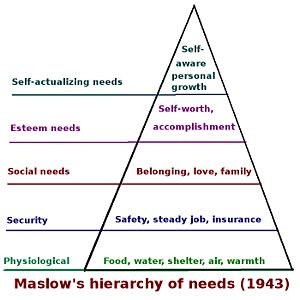Humanistic psychology: Difference between revisions
imported>Howard C. Berkowitz (Commented out WP material for complete rewrite) |
imported>Howard C. Berkowitz No edit summary |
||
| Line 1: | Line 1: | ||
{{subpages}} | {{subpages}} | ||
'''Humanistic psychology''', as a general concept, began with | '''Humanistic psychology''', as a general concept, began with the works of [[Abraham Maslow]] and his [[hierarchy of human needs]]. Maslow and some others in humanistic psychology regarded [[transpersonal psychology]] as a further development, but this is not the majority approach. | ||
==Human needs== | ==Human needs== | ||
In 1937, he began to teach at Brooklyn College, [[City University of New York]], and produced some of his best-known work. During this time, he said he was inspired by colleagues including the anthropologist [[Ruth Benedict]] and [[Gestalt psychology|Gestalt]] psychologist [[Max Wertheimer]], whom he was to regard as models of "self-actualizing" people operating at the highest level of human consciousness. Earlier researchers such as Freud had focused on illness, while Pavlov looked for actions dictated by other than conscious choice. Maslow, however, was interested in the optimal, conscious capabilities of people.<ref name=PBS>{{citation | In 1937, he began to teach at Brooklyn College, [[City University of New York]], and produced some of his best-known work. During this time, he said he was inspired by colleagues including the anthropologist [[Ruth Benedict]] and [[Gestalt psychology|Gestalt]] psychologist [[Max Wertheimer]], whom he was to regard as models of "self-actualizing" people operating at the highest level of human consciousness. Earlier researchers such as Freud had focused on illness, while Pavlov looked for actions dictated by other than conscious choice. Maslow, however, was interested in the optimal, conscious capabilities of people.<ref name=PBS>{{citation | ||
Revision as of 08:33, 17 August 2010
Humanistic psychology, as a general concept, began with the works of Abraham Maslow and his hierarchy of human needs. Maslow and some others in humanistic psychology regarded transpersonal psychology as a further development, but this is not the majority approach.
Human needs
In 1937, he began to teach at Brooklyn College, City University of New York, and produced some of his best-known work. During this time, he said he was inspired by colleagues including the anthropologist Ruth Benedict and Gestalt psychologist Max Wertheimer, whom he was to regard as models of "self-actualizing" people operating at the highest level of human consciousness. Earlier researchers such as Freud had focused on illness, while Pavlov looked for actions dictated by other than conscious choice. Maslow, however, was interested in the optimal, conscious capabilities of people.[1]
He proposed the hierarchy of needs model in 1943 in a paper entitled A Theory of Human Motivation, which assumed people had a hierarchy of needs, and that it was necessary for the basic needs to be fulfilled first before advancing on to more sophisticated needs.
